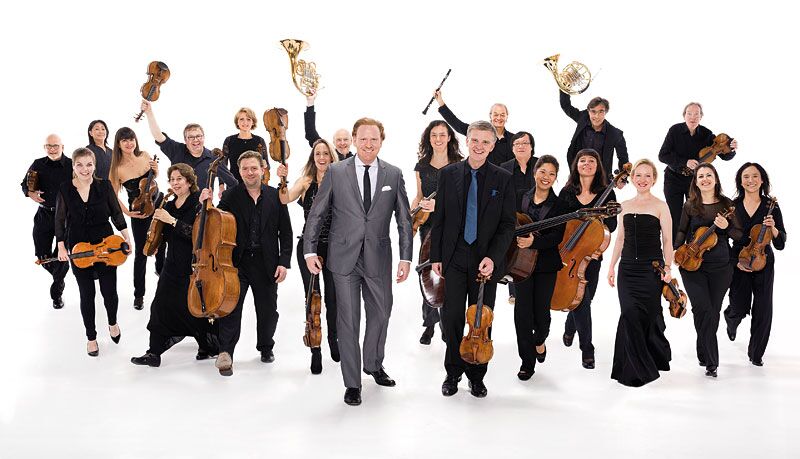Hope, Zurich Chamber Orchestra deliver enjoyable program of American music

Daniel Hope (center) and the Zurich Chamber Orchestra performed Sunday at the Kravis Center in West Palm Beach.
When European ensembles tour the United States, they typically focus on composers from classical music’s Austro-German heartland, such as Brahms, Mendelssohn, and Mahler.
So there was something refreshing—and a bit flattering to we Americans—that the Zurich Chamber Orchestra performed an all-American program Sunday at the Kravis Center in West Palm Beach. The program came from the orchestra’s recent recording called “America,” which was full of the works of Americans by birth, like Aaron Copland and Leonard Bernstein, and by choice, such as Kurt Weill.
If not the heaviest concert on Kravis’ classical calendar this season, it may well have been the most entertaining, with brilliant, quirky takes on a lot of familiar works. Performing standing, with the men in black and the women in black and red, the orchestra was led by the concert violinist Daniel Hope, who put in a long afternoon as soloist.
When the rigorously trained musicians of a classical ensemble perform American popular music, the only flaw to be expected may be an excess of refinement, a pristine tone that lacks the raucous energy of the music’s populist roots.
But the Zurich musicians got a surprising amount of country-fiddle grit into the first work on the program, the “Hoe-Down” from Aaron Copland’s Rodeo. The rest of the concert was more urban in character —with composers such as Gershwin, Weill and Ellington—and with the ensemble’s polish and feel for the jazzy scores’ twists and turns, they often sounded like the world’s greatest hotel ballroom orchestra.
A big part of the first half was devoted to songs by Kurt Weill arranged by Paul Bateman, who arranged several other works on the program. Violinist Hope’s masterful uses of slides and various bowing techniques gave the music urgency and a 1930s and 40s feel.
In “Havana Song,” Hope’s intense violin line soared above a galloping accompaniment in the orchestra. “September Song “was one of the few works that came off as uncharacteristically classical and excessively prettified, without its essential bittersweet tone. If the performance of “Mack the Knife” appeared at first to suffer from similar faults, Hope’s blazing violin playing, with runs, his bow skittering across the string and other virtuoso techniques gave it a real electric excitement.
Florence Price’s “Adoration” was paired with Duke Ellington’s “Come Sunday,” and both works were executed with glowing strings in the sweet, warmly harmonized melodies.
After intermission, the orchestra played Barber’s famous Adagio for Strings. There was nothing fresh or different about the performance, just great playing, with rich, well-balanced tone and a powerful emotional edge to the high dissonant chords at its climax.
The performance of Copland’s “By the River” may have sounded too rich and symphonic at first. But it rose to such a height of dignity and intensity that any objections faded away.
The only work by a living composer was Echorus by Philip Glass, with Hope and concertmaster Willi Zimmerman as violin soloists. The music followed Glass’s typical technique of developing the music against a strong harmonic pattern, and the two soloists skillfully kept the music crisp and clear through its bumpy rhythms and drawn-out crescendo.
For the Gershwin songs that ended the program, the ensemble was joined by pianist Eric Jones, who contributed lively, jazzy solos and support playing. “Fascinatin’ Rhythm” had a bluesy tone that felt authentic. “Summertime” came off as a little too intense, without its sultry southern tone. “I Got Rhythm” was a lively few minutes of Gershwin melody.
As their first encore, they performed a work by another American composer who straddled classical and popular music, giving a spirited performance of “America” from Leonard Bernstein’s West Side Story. They ended with their only European work, the Waltz from Tchaikovsky’s Serenade for Strings, given honorary American status, Hope explained, because Tchaikovsky scored a big success with that work on his U.S. visit.
Posted in Performances
Leave a Comment
Mon Mar 20, 2023
at 10:08 am
No Comments






